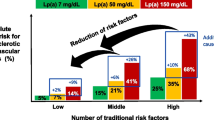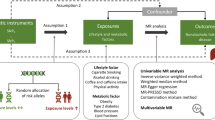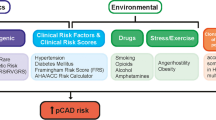Summary
Objective
Two common variations of peroxisome proliferator-activated receptor γ (PPARG), P12A (Pro12Ala, rs1801282), and C161T (His447His, rs3856806), are thought to have an effect on susceptibility to coronary heart disease (CHD), but the results are inconsistent. Therefore, a meta-analysis of published studies was performed.
Methods
The electronic databases, PubMed, Embase, Web of Science, and CNKI (China National Knowledge Infrastructure) were searched for studies to include in the present meta-analysis (last search was updated on 30 Aug. 2011). Twenty studies testing the association between PPARG gene polymorphisms and CHD were examined: 12 studies of P12A; 8 studies of C161T. Overall and ethnicity-specific summary odds ratios and corresponding 95 % confidence intervals for CHD associated with these polymorphisms were estimated using fixed- and random-effects models. Heterogeneity and publication bias were evaluated. A total of 20 studies including 5,795 cases and 9,069 controls were included in this meta-analysis.
Results
No significant associations were found in carriers of the rare Ala allele of the P12A polymorphism versus the common Pro/Pro genotype among the studies with both of the fixed-effect and random-effect model. In the subgroup analyses by ethnicity, source of control and type of study, no significant risks were found. For PPARG C161T, carriers of the T variant of C161T polymorphism were associated with an increased risk of CHD (OR = 1.182, 95 % CI: 1.023–1.341, Pheterogeneity = 0.002), and in the stratified analysis by ethnicity and source of controls, the contrast of CT + TT vs. CC all produced significant association in Asian and hospital-based controls (OR = 1.276, 95 % CI: 1.084–1.468, Pheterogeneity = 0.055; OR = 1.164, 95 % CI: 1.001–1.326, Pheterogeneity = 0.002),when the fixed-effect model was used. But they were all insignificant with the random-effect model.
Conclusion
This meta-analysis suggests that the PPARG C161T polymorphism marginally contributes to increased susceptibility to CHD and marginally increased association between PPARG H477H polymorphism and CHD also appeared in Asian and hospital-based controls. But PPARG P12A polymorphism is not associated with CHD risk.
Zusammenfassung
Ziel der Studie
Von zwei häufigen Variationen des Peroxisomen Proliferator-aktivierten Rezeptors γ (PPARG), P12A (Pro12Ala, rs1801282) und C161T (His447His, rs3856806), wird vermutet, dass sie eine Auswirkung auf die Anfälligkeit, eine koronare Herzkrankheit (CHD) zu bekommen, haben. Die Ergebnisse sind allerdings widersprüchlich, weshalb eine Meta-Analyse der publizierten Studien durchgeführt wurde.
Methodik
Die elektronischen Datenbanken PubMed, Embase, Web of Science, und CNKI (China National Knowledge Infrastructure) wurden nach Studien zum Einschluss in die vorliegende Meta-Analyse untersucht (die letzte Suche wurde mit 30.8.2011 upgedatet). Es wurden 20 Studien, die den Zusammenhang zwischen PPARG Gen Polymorphismen und der CHD untersuchten, geprüft: zwölf bzgl. P12A und acht bzgl. C161T. Gesamt- und ethnisch spezifische Summary Odd Ratios und 95 % Konfidenz Intervalle für den Zusammenhang zwischen diesen Polymorphismen und einer CHD wurden mit Hilfe von fixen und Zufalls-Wirkungsmodellen errechnet. Die Studien wurden auf Heterogenität und mögliche Vorurteile geprüft. In diese Metaanalyse von 20 Studien wurden insgesamt 5.795 Patienten und 9.069 Kontrollen eingeschlossen.
Ergebnisse
Bei den Trägern des seltenen Ala Allels des P12A Polymorphismus wurden im Vergleich zum häufigen Pro/Pro Genotyp bei der Auswertung der Studien unter Verwendung beider statistischen Modelle keine signifikanten Assoziationen gefunden. Die Subgruppen-Analyse auf Volkszugehörigkeit, auf Zusammensetzung der Kontrolle und auf Art der Studien ergab kein signifikantes Risiko für einen dieser Faktoren. Bezüglich PPARG C161T hatten die Träger der T Variante des C161T Polymorphismus ein erhöhtes Risiko, eine CHD zu bekommen (OR = 1.182, 95 % CI: 1.023–1.341, Pheterogeneity = 0.002). In der stratifizierten Analyse auf ethnische Unterschiede und Ursprung der Kontrollen ergab der Kontrast von CT + TT versus CC bei asiatischen und aus dem Spital ausgesuchten Kontrollen, eine signifikante Assoziation (OR = 1.276, 95 % CI: 1.084–1.468, Pheterogeneity = 0.055; OR = 1.164, 95 % CI: 1.001–1.326, Pheterogeneity = 0.00). Diese Signifikanz ergab sich allerdings nur bei Berechnung mittels des fixed-effect Modells. Die Berechnung mit Hilfe des Random-Effect Modells ergab keine Signifikanz.
Schlussfolgerung
Entsprechend den Ergebnissen dieser Metaanalyse scheint der PPARGC161T Polymorphismus nur marginal zu einer erhöhten Anfälligkeit, eine CHD zu bekommen, beizutragen. Die gering erhöhte Assoziation zwischen dem PPARGH477H Polymorphismus und der CHD war auch bei Asiaten und bei aus dem Spital rekrutierten Kontrollen zu beobachten. Der PPARGP12A Polymorphismus ist allerdings nicht mit einem erhöhten Risiko, an einer CHD zu leiden, assoziiert.


Similar content being viewed by others
References
Ashokkumar M, Veera Subhashini NG, Kanthimathi S, et al. Associations for lipoprotein lipase and peroxisome proliferator-activated receptor-gamma gene and coronary artery disease in an Indian population. Arch Med Res. 2010;41(1):19–25 e1.
Beaven SW, Tontonoz P. Nuclear receptors in lipid metabolism: targeting the heart of dyslipidemia. Ann Rev Med. 2006;57:313–29.
Chao TH, Li YH, Chen JH, et al. The 161tt genotype in the exon 6 of the peroxisome-proliferator-activated receptor gamma gene is associated with premature acute myocardial infarction and increased lipid peroxidation in habitual heavy smokers. Clin Sci. (Lond) (2004);107(5):461–6.
Deeb SS, Fajas L, Nemoto M, et al. A pro12ala substitution in ppargamma2 associated with decreased receptor activity, lower body mass index and improved insulinsensitivity. Nat Genet. 1998;20(3):284–7.
Doney AS, Fischer B, Cecil JE, et al. Association of the pro12ala and c1431t variants of pparg and their haplotypes with susceptibility to type 2 diabetes. Diabetologia 2004;47(3):555–8.
Doney AS, Fischer B, Leese G, et al. Cardiovascular risk in type 2 diabetes is associated with variation at the pparg locus: A go-darts study. Arterioscler Thromb Vasc Biol. 2004;24(12):2403–7.
Egger M, Davey SG, Schneider M, et al. Bias in meta-analysis detected by a simple, graphical test. BMJ. 1997;315(7109):629–34.
Evangelisti L, Attanasio M, Lucarini L, et al. Ppargamma promoter polymorphisms and acute coronary syndrome. Atherosclerosis 2009;205(1):186–91.
Galgani A, Valdes A, Erlich HA, et al. Homozygosity for the ala allele of the ppargamma2 pro12ala polymorphism is associated with reduced risk of coronary artery disease. Dis Markers. 2010;29(5):259–64.
Kota BP, Huang TH, Roufogalis BD. An overview on biological mechanisms of ppars. Pharmacol Res. 2005;51(2):85–94.
Li L, Cheng LX, Nsenga R, et al. Association between pro12ala polymorphism of peroxisome proliferator-activated receptor-gamma 2 and myocardial infarction in the Chinese Han population. Clin Cardiol. 2006;29(7):300–4.
Liu Y, Yuan Z, Zhang J, et al. Ppargamma gene c161t substitution is associated with reduced risk of coronary artery disease and decreased proinflammatory cytokine expression. Am Heart J. 2007;154(4):718–24.
Masugi J, Tamori Y, Mori H, et al. Inhibitory effect of a proline-to-alanine substitution at codon 12 of peroxisome proliferator-activated receptor-gamma 2 onthiazolidinedione-induced adipogenesis. Biochem Biophys Res Commun. 2000;268(1):178–82.
Peng DQ, Zhao SP, Nie S, et al. Gene-gene interaction of ppargamma and apoe affects coronary heart disease risk. Int J Cardiol. 2003;92(2–3):257–63.
Pischon T, Pai JK, Manson JE, et al. Peroxisome proliferator-activated receptor-gamma2 p12a polymorphism and risk of coronary heart disease in us men and women. Arterioscler Thromb Vasc Biol. 2005;25(8):1654–8.
Rhee EJ, Kwon CH, Lee WY, et al. No association of pro12ala polymorphism of ppar-gamma gene with coronary artery disease in Korean subjects. Circ J. 2007;71(3):338–42.
Ridker PM, Cook NR, Cheng S, et al. Alanine for proline substitution in the peroxisome proliferator-activated receptor gamma-2 (pparg2) gene and the risk of incident myocardial infarction. Arterioscler Thromb Vasc Biol. 2003;23(5):859–63.
Ruiz-Narvaez EA, Kraft P, Campos H. Ala12 variant of the peroxisome proliferator-activated receptor-gamma gene (pparg) is associated with higher polyunsaturated fat in adipose tissue and attenuates the protective effect of polyunsaturated fat intake on the risk of myocardial infarction. Am J Clin Nutr. 2007;86(4):1238–42.
Schoonjans K, Martin G, Staels B, et al. Peroxisome proliferator-activated receptors, orphans with ligands and functions. Curr Opin Lipidol. 1997;8(3):159–66.
Stumvoll M, Häring H. The peroxisome proliferator-activated receptor-gamma2 pro12ala polymorphism. Diabetes 2002;51(8):2341–7.
Vogel U, Segel S, Dethlefsen C, et al. Ppargamma pro12ala polymorphism and risk of acute coronary syndrome in a prospective study of Danes. BMC Med Genet. 2009;10:52.
Wan J, Xiong S, Chao S, et al. Ppargamma gene c161t substitution alters lipid profile in Chinese patients with coronary artery disease and type 2 diabetes mellitus. Cardiovasc Diabetol. 2010;9:13.
Wang XL, Oosterhof J, Duarte N. Peroxisome proliferator-activated receptor gamma c161→t polymorphism and coronary artery disease. Cardiovasc Res. 1999;44(3):588–94.
Yilmaz-Aydogan H, Kurnaz O, Kurt O, et al. Effects of the pparg p12a and c161t gene variants on serum lipids in coronary heart disease patients with and without type 2 diabetes. Mol Cell Biochem. 2011;358(1–2):355–63.
Zafarmand MH, Van Der Schouw YT, Grobbee DE, et al. Peroxisome proliferator-activated receptor gamma-2 p12a polymorphism and risk of acute myocardial infarction, coronary heart disease and ischemic stroke: a case-cohort study and meta-analyses. Vasc Health Risk Manag. 2008;4(2):427–36.
Zhou X, Chen J, Xu W. Association between c1431t polymorphism in peroxisome proliferator-activated receptor-gamma gene and coronary artery disease in Chinese Han population. Mol Biol Rep. 2012;39(2):1863–8.
Conflict of interest
The authors declare that there is no actual or potential conflict of interest in relation to this article.
Author information
Authors and Affiliations
Corresponding author
Rights and permissions
About this article
Cite this article
Ding, S., Liu, L., Zhuge, QC. et al. The meta-analysis of the association of PPARG P12A, C161T polymorphism and coronary heart disease. Wien Klin Wochenschr 124, 671–677 (2012). https://doi.org/10.1007/s00508-012-0223-0
Received:
Accepted:
Published:
Issue Date:
DOI: https://doi.org/10.1007/s00508-012-0223-0
Keywords
- Peroxisome proliferator-activated receptor γ (PPARG)
- Coronary heart disease (CHD)
- Polymorphism
- Susceptibility
- Meta-analysis




